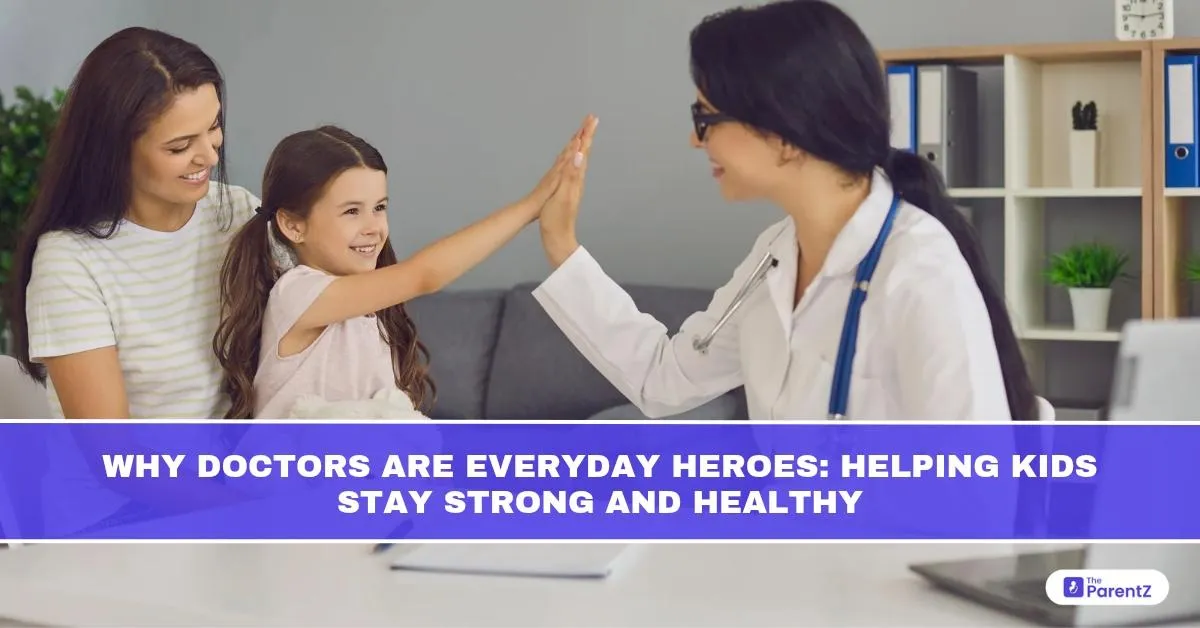When we think of heroes, we often imagine capes, superpowers, and daring rescues. But some of the greatest heroes don’t wear masks or fly, they wear white coats and carry stethoscopes. Doctors are everyday heroes who help children stay strong, healthy, and happy. From newborn check-ups to caring for injuries and preventing illnesses, they are always there to guide kids and their families.
1. Keeping Kids Safe From the Start
Doctors begin caring for children even before they are born. Pediatricians and obstetricians monitor mothers during pregnancy to ensure babies grow well. After birth, doctors check newborns for any problems, help parents with feeding, and teach them how to keep their little ones safe and comfortable.
As children grow, doctors give vaccinations that protect them from dangerous diseases like measles, polio, and whooping cough. These shots act like invisible shields, helping kids stay healthy while they explore the world.
2. Healing Injuries Big and Small
Scraped knees, sprained ankles, and even broken bones are common in childhood adventures. Doctors treat these injuries with care so kids can get back to running, jumping, and playing. Pediatric doctors know how to make young patients feel calm and supported when they’re hurt. They use child-friendly explanations and gentle techniques to help little bodies heal quickly.
Doctors also help kids who need surgeries for more serious problems—fixing heart defects, removing appendixes, or repairing injuries. Surgeons and their medical teams work like superheroes behind the scenes, giving children the chance to live full, active lives.
3. Managing Long-Term Health Conditions
Some children have chronic illnesses like asthma, diabetes, or allergies. Doctors help manage these conditions so kids can go to school, play sports, and enjoy life. By teaching kids and their parents how to use inhalers, monitor blood sugar, or avoid triggers, doctors empower families to keep these conditions under control.
Regular check-ups help catch problems early and prevent complications. Pediatricians often work closely with specialists like allergists or endocrinologists to create care plans that fit each child’s unique needs.
4. Supporting Mental and Emotional Health
Doctors care for more than just bodies, they look after feelings, too. Pediatricians and child psychologists help kids who feel sad, anxious, or overwhelmed. Whether it’s worries about school, problems with friends, or big changes at home, doctors provide support and connect families with counselors if needed.
A 2024 article in Pediatrics highlights how early mental health support reduces long-term issues like depression and boosts school performance. By listening without judgment, doctors give kids the courage to speak up and ask for help.
5. Teaching Healthy Habits
Doctors are teachers who help kids build habits that keep them strong. They explain the importance of brushing teeth, washing hands, getting enough sleep, eating healthy foods, and exercising. Many pediatricians use fun tools like posters, games, and stories to help children learn these habits in a positive way.
Good habits learned early can prevent diseases later in life, such as heart problems, obesity, and type 2 diabetes. Doctors encourage kids to make choices today that will help them stay healthy as adults.
6. Protecting Communities
Doctors are heroes not just for individual children, but for entire communities. During disease outbreaks like COVID-19, they work long hours to care for sick patients, give vaccines, and share accurate information to keep families safe. Pediatricians also advocate for clean water, better nutrition, and safer environments so all kids can grow up healthy.
Doctors work with schools, governments, and organizations to make sure every child, no matter where they live, has access to healthcare. Their dedication helps reduce health inequalities and create stronger, healthier communities.
7. Building Trust and Kindness
Doctors help kids feel brave during difficult moments. By explaining what will happen, answering questions, and giving reassurance, they make doctor visits less frightening. Pediatricians often use stickers, toys, and friendly conversations to help children relax and feel comfortable.
This kindness builds trust, which makes kids more likely to tell doctors how they feel and follow advice that keeps them healthy. A positive relationship with a doctor can inspire children to dream of helping others, too.
Conclusion
Doctors are everyday heroes who dedicate their lives to keeping children healthy, safe, and strong. From treating illnesses and injuries to teaching healthy habits and supporting emotional well-being, they make a lasting difference in every child’s life. By recognizing and appreciating doctors’ heroic work, we can teach kids the importance of health and inspire them to take care of themselves and maybe even become heroes themselves one day.





Be the first one to comment on this story.